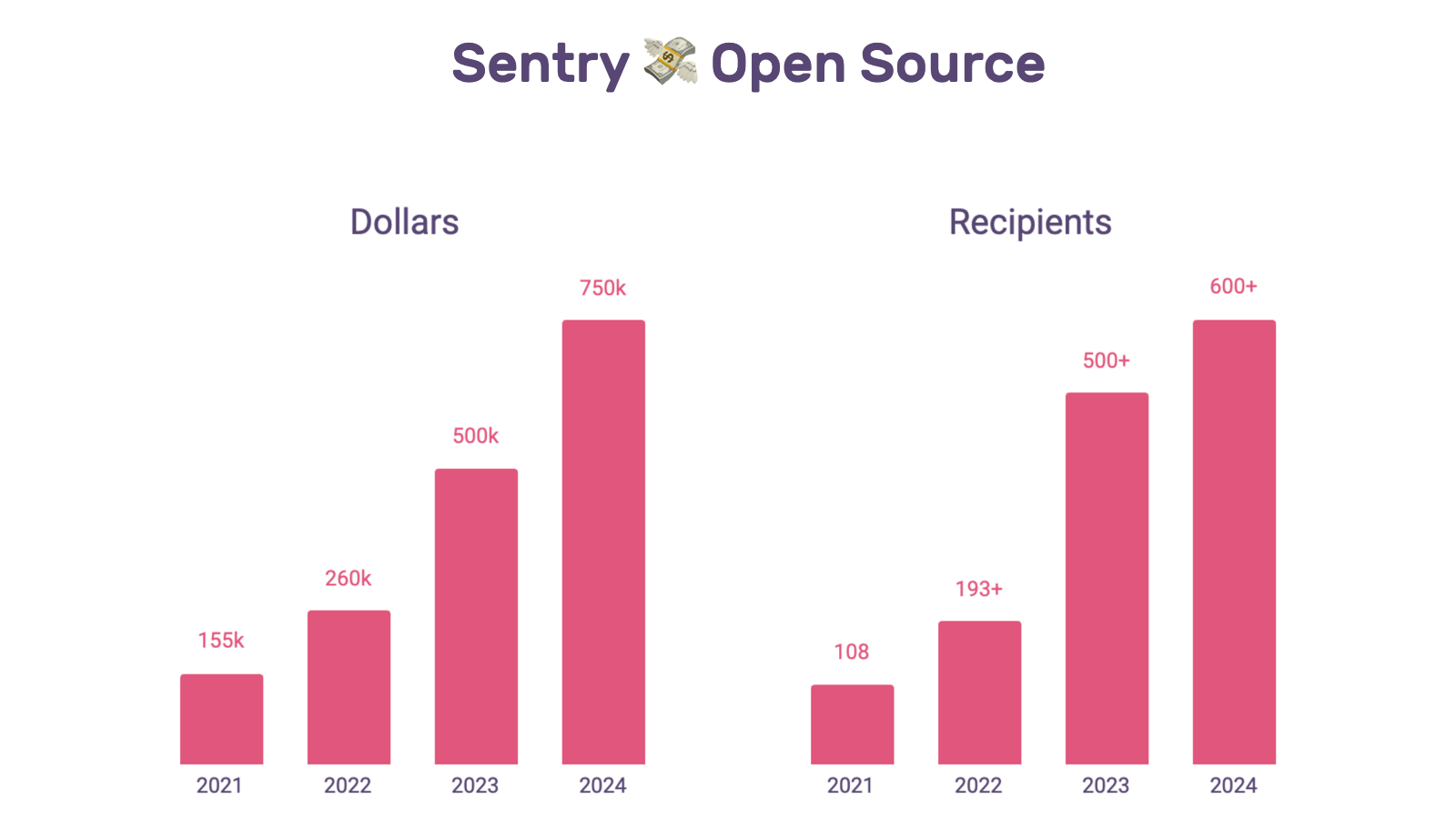We Just Gave $750,000 to Open Source Maintainers
We Just Gave $750,000 to Open Source Maintainers
Sentry started out as an Open Source side project in 2008. Today we are a Fair Source company with 100,000+ organizations on our SaaS and $100M+ ARR, but we have not forgotten our roots nor the hundreds of Open Source maintainers whose work we depend on for our success. Every year we share our success with the community, and 2024 is no different. This year, our budget is $750,000, up 50% from last year. We have 129 engineers right now, so that works out to $5,813 per developer on staff.
The Open Source Pledge Exists Now
Of course, the big news this year is that, together with dozens of other companies, we launched the Open Source Pledge. It’s great that Sentry pays maintainers, but we can’t solve the Open Source sustainability crisis by ourselves. The good news is that we’re not alone. Through the Pledge, many other companies are also stepping up to the plate, paying maintainers at least $2,000 per year per dev on staff and blogging about it annually to drive awareness and accountability.
If your company would like to be part of this movement alongside the likes of Laravel, HeroDevs, StackBlitz, GitButler, and, as of today, Sanity, learn how to join.
Sentry’s Distributions for 2024
Our main distributions this year are as follows:
Recipient | Amount ($) |
|---|---|
Django | 30,000 |
OSI | 30,000 |
Outreachy | 25,000 |
Python | 16,500 |
OpenJS | 15,000 |
Rust | 15,000 |
rrweb | 15,000 |
SPI (PostgreSQL) | 15,000 |
Geomys (Go) | 15,000 |
PHP | 12,000 |
Apache | 10,000 |
Ruby Central | 10,000 |
.NET | 10,000 |
sum | 218,500 |
% of overall budget | 29 |
Armin Nehzat at thanks.dev helped me manage these relationships again. For the other $531,500, we used three platforms to distribute money in an automated fashion to smaller projects and individual maintainers.
thanks.dev - $381,500 (totaling $600,000 with the above-managed distributions) - Honestly, the algorithmic allocations on thanks.dev are almost too powerful. I get kind of lost balancing the forest and the trees now that we have well over 500 recipients across seven ecosystems.
GitHub Sponsors - $75,000 - GitHub offers very rudimentary tools for bulk sponsorship. They don’t include any algorithmic allocation. For this reason, we keep it simple on Sponsors, distributing small amounts monthly to as many maintainers of our dependencies as we can. This year, it seems that many of you have been upping your minimums—as you probably should!—so we only achieved about 90% coverage across our three orgs (getsentry, codecov, and syntaxfm). That said, the Syntax crew is having some extra fun with part of this budget ... more details on that soon.
Open Source Collective - $75,000 - Open Source Collective is working on a pilot program to allocate funds algorithmically using data from Ecosyste.ms. Does your company want to be part of it? Reach out to OSC. I’ll update this post with a link to how specifically these funds were distributed when that program starts up. Update: Here's the announcement for ecosyste.ms funds (the $67,500 referenced is $75,000 less the 10% platform fee).
With the Open Source Pledge, we are working to unlock the flow of funds from companies to maintainers. Insofar as we are successful, we will need to have a lot more conversations about how to allocate those funds.
I see a lot of proposals around allocation that require companies to pay more attention to their dependencies through bounties, goals, perks, and whatnot. The problem is that attention is expensive. There are way too many of you maintainers for me to decide precisely what to pay each one of you individually based on a full review of your contributions and circumstances. We need approaches to allocation that require less attention, especially to win over companies who care a lot less about Open Source maintainers than Sentry does. Write a big check, pick a few high-level ecosystems, … and then what? I see two options: algorithms and people.
On the one hand, platforms such as thanks.dev, Open Collective, and GitHub Sponsors can keep developing and refining algorithms for allocation. We are really early days on this. Platforms have an opportunity to differentiate and earn the community’s trust by developing allocation algorithms openly and transparently.
On the other hand, I see an opportunity for the leadership of FOSS foundations to take on more responsibility. Their scope has been expanding for decades. Newer entities such as the PHP Foundation intentionally focus on paying maintainers, at least for the core, if not the wider library ecosystem. The Pledge intends to pay maintainers so Open Source stays healthy. Ecosystem foundations seem to me to be a natural venue for each community to hash out for itself the best way to distribute funds toward that end.
One way or another, we’re proud at Sentry to run our own Open Source funding program for the fourth year in a row and to continue driving this wider conversation. We’re grateful to all of you maintainers out there, and we invite other companies to join us in paying the maintainers through the Open Source Pledge.




